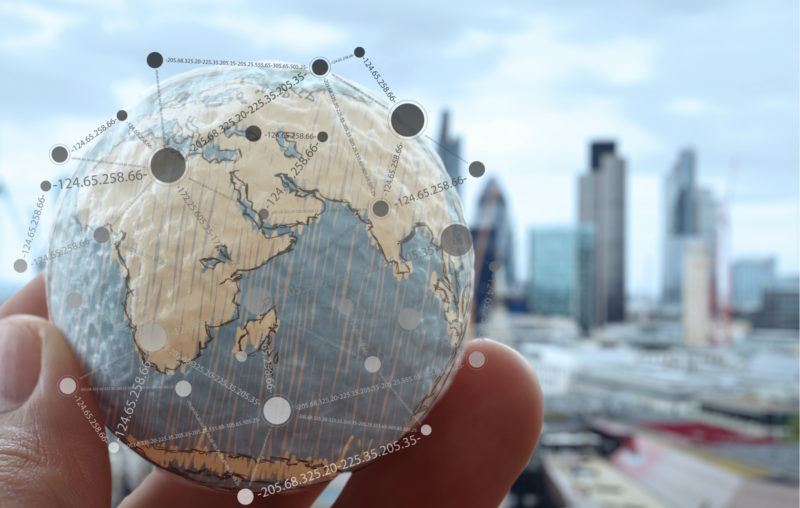Don’t Blame Globalism for COVID-19

Like every crisis, the COVID-19 pandemic has opened the door to all sorts of ideas. Some of these ideas are good, but many of them are terrible. The undoubtedly worst idea of all, though, is that this pandemic was caused and aggravated by globalization and free markets.
It’s actually fascinating, in its own perverse way. While the U.S. government has consistently run vast budget deficits, and with millions of government regulations dictating what we can do, can’t do, and how to do and not do it, some people nevertheless persist in claiming that we live in a world where market fundamentalism runs rampant – a veritable laissez-faire hell with government nowhere to be found. It is even more interesting to see capitalism generally, and globalization specifically, accused of being culprits of this pandemic. It’s as if never before the industrial age have pandemics killed millions of people.
I guess those who blame globalization and free markets for this pandemic have forgotten that pandemics of the past killed millions, and that it took centuries before Louis Pasteur, in 1885, building on the knowledge accumulated over centuries, created the first vaccines for rabies and other lethal diseases. Other followed in his steps but it was neither easy nor speedy.
COVID-19 is not a disease of globalization and market fundamentalism. In fact, globalization and free markets will rescue us more quickly than otherwise from this nightmare. The truth is that, thanks to the globalization of science, knowledge and innovation spread at a record speed across international borders.
A few weeks ago, Johan Norberg gave a timeline in a brief video challenging the claim that globalization was responsible for this pandemic.
As he notes, it took a mere one week for Chinese scientists to figure out the virus’s DNA sequence using technology from the other side of the globe. Thanks also to global cooperation, German scientists produced a first test within a week, soon followed by many other tests, and as of today, there are hundreds of scientists and companies all around the world searching now for cures and vaccines. As Ron Bailey, of Reason, reminds us:
“Biotech companies are racing to develop a vaccine against the new malady while others are testing their currently available anti-viral treatments to see if they can ameliorate the symptoms of infected people. The biotech company Moderna developed its vaccine against COVID-19 just 42 days after the company received the genetic sequence information on the coronavirus. The company has already delivered that vaccine to the National Institutes of Health for human trials whose results should be known by the end of April. Even if successful, a vaccine would not be widely available for at least a year.”
Bailey also recently reported on a potential game changer, in less than 3 months into this fight against this virus:
“The researchers have created molecular tags that latch onto sections of viral genes and emit a signal when their presence is detected. The new STOPCovid test enables the detection of as few as 100 copies of the coronavirus in a sample. “As a result, the STOPCovid test allows for rapid, accurate, and highly sensitive detection of Covid-19 that can be conducted outside clinical laboratory settings,” note the researchers. The test initially used standard nasal swab samples, but preliminary data suggest that it will work using much more easily collected saliva samples.”
Through intense competition, but also extensive collaboration, scientists around the world are working to find the cure and vaccines we need, pharmaceutical companies are investing millions of dollars in the R&D necessary to eventually produce the drugs we need, and free markets are supporting these efforts thanks to the immense wealth created over the past several decades.
But you know who hasn’t been helpful? The CDC and the FDA. These government agencies failed to prepare for this pandemic and have, since the beginning of this crisis, also erected so many barriers that get in the way of innovators. Unfortunately, I doubt they will get more than a slap on the wrist for their failures and will more likely be rewarded with bigger budgets in an attempt to “fix” the issue.
The truth of the matter is that those on the right and the left who are eager to blame globalization and market fundamentalism (whatever this latter term means) for this pandemic are using the crisis as an excuse to remake the world into the image they were advocating for before this crisis began.
They want nationalism, protectionism, less or no immigration, more top-down policies, and more taxes on the rich. They were against trade, immigration, technology, and markets before and they are now opportunistically using this pandemic as a convenient, almost heaven-sent, opportunity to push for the same pro-government interventions and the same semi-authoritarian regimes they advocated earlier.
These proponents of state intervention, promising everyone a glorious future designed by the few enlightened ones and enforced by the governments, had so far been unable to get all of the policies they seek. And now these statists presume – merely presume – that COVID-19 somehow proves the value of such policies. This presumption is completely without any base or justification.
What our world will be like after this pandemic ends, I do not know. No one does. But for our sake, I hope that we won’t be permanently cast into the nightmare of a Brave New World dreamed up by all the weak and strong authoritarians out there who so arrogantly believe they, with their plans, schemes, taxes and subsidies, can outperform the market order in performing the task of improving the lives of ordinary people.
If they do, we will quickly find out that the most dangerous virus on the loose today is not one that can be seen with a microscope or cured with a chemical vaccine; instead, it is the presumption that the lives of ordinary people, the decisions made by investors, employers and innovators, should be controlled in detail by the state.










